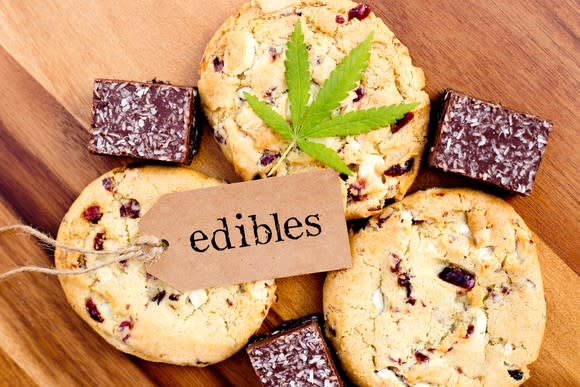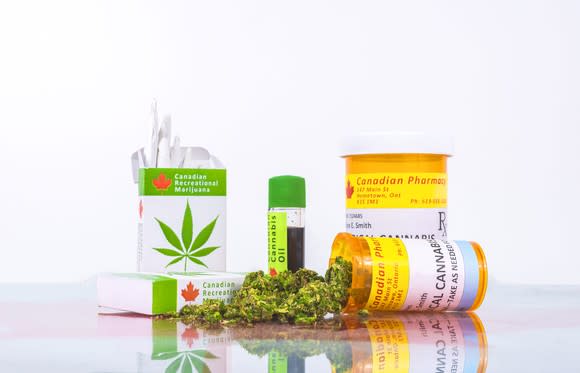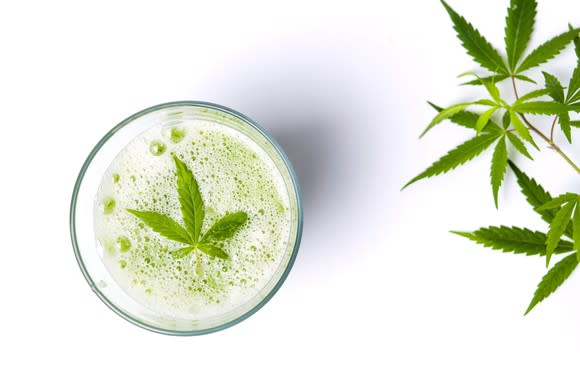Marijuana Edibles and Infused Beverages Should Go On Sale in Canada by October
The marijuana industry blossomed before our eyes in 2018, with the cannabis movement taking steps toward legitimacy like never before.
In the United States, Food and Drug Administration approved its very first cannabis-derived drug, and President Trump signed the Farm Bill into law, legalizing hemp and hemp-based cannabidiol products. But of all events, none offered more validity to the long-term cannabis business model than the legalization of recreational marijuana in Canada this past October. Although this legalization will generate billions of dollars in added annual sales, it's the legitimacy of weed now being legal that's worth even more.

Image source: Getty Images.
The wait for alternative cannabis options lingers on in Canada
However, Canada's legalization wasn't as broad-based as you might think. Although dried cannabis flower, sublingual sprays, and cannabis oils were legalized, other popular forms of consumption were not. This included edibles, cannabis-infused beverages, extracts/concentrates, topicals, and vapes. This was likely done to expedite the approval of the Cannabis Act through Parliament, as well as allow the industry to get its bearings.
One of the bigger questions has been when the Canadian government would address alternative consumption options. Since dried cannabis flower has been commoditized in a handful of recreationally legal U.S. states, the expectation is that Canada will follow suit in the years to come. This puts alternative marijuana products into the spotlight, since they're expected to have higher price points, higher margins, and be far less susceptible to pricing pressure, than dried flower.
New consumption options are coming, but there are caveats
Recently, Health Canada helped put some of those questions to rest by laying out its plan of action on alternative consumption options. According to a rough outline provided by the Canadian regulatory agency, and detailed by the National Post, edibles, infused beverages, topicals, and extracts should be legal by this fall, no later than Oct. 17, 2019. That's exactly one year after adult-use pot became legal for sale in Canada. Of course, there are plenty of caveats to this product expansion.
For example, the draft provided by Health Canada calls for strict caps on the amount of tetrahydrocannabinol (THC) that these products can contain. THC is the psychoactive cannabinoid responsible for getting a user high. The agency suggests that no package of edibles would be permitted more than 10 milligrams of THC, with topicals and extracts limited to 1,000 milligrams of THC.

Image source: Getty Images.
Just as we've witnessed in the U.S., there would also be strict packaging regulations on edibles to make them less appealing to children. Packaging that resembled candy or other foods familiar with children wouldn't be allowed, and neither would ingredient labeling that would attract kids, such as sweeteners. The packaging itself must also be tamper- and child-resistant, plain, and carry the standard health warning.
Edible, topical, and extract producers would also be barred from making any health benefit or nutrition claims on their packaging.
Interestingly, the one item left off the list is cannabis-infused alcoholic beverages. Although nonalcoholic infused beverages should be legal within the next nine months, those containing alcohol will have to wait a bit longer.
These companies are champing at the bit for the green flag to wave
With few exceptions, this draft from Health Canada was music to the ears of cannabis producers and ancillary players. Now they're simply champing at the bit for these products to be legalized.
Last August, Molson Coors Brewing Co. (NYSE: TAP) announced a 57.5%-42.5% joint venture with Quebec-based HEXO that'll see the duo work on developing and retailing a line of cannabis-infused beverages in Canada. Molson Coors has seen its beer market share decline in Canada over the past decade, and is hoping that the marijuana industry can reignite top-line growth with a line of non-alcoholic infused beverages. With Molson Coors' expertise in marketing new products, and HEXO's intricate knowledge of the cannabis industry, this duo is eager to diversify their portfolio of products.

Image source: Getty Images.
KushCo Holdings (NASDAQOTH: KSHB) should be nothing short of thrilled with Health Canada's initial outline. KushCo is first and foremost known for providing packaging and branding solutions to more than 5,000 marijuana growers. KushCo provides packaging, labeling, and branding options to ensure that companies remain compliant with federal, state, and/or local laws, but also works with its clients to help their products stand out in an increasingly crowded field.
To add, KushCo also provides hydrocarbon gases and solvents. The former is critical to the production of cannabis oils, with solvents needed for the production of concentrates. As the number of alternative consumption options expands, the demand for hydrocarbon gases and solvents from KushCo should rise.
Even off-the-radar pot stocks have to be excited with this announcement. For example, The Green Organic Dutchman (NASDAQOTH: TGODF) projects as one of the top producers in the country at 195,000 kilograms per year, but has been mostly an afterthought given that it's yet to generate a dollar in revenue. That changes in 2019, and not just because pot sales will commence.
The Green Organic Dutchman announced in June that it'd be devoting 40,000 kilogram-equivalents of its peak capacity each year to edibles and infused beverages. Considering how much production The Green Organic Dutchman is capable of, and taking into account how much of that output is being devoted to high-margin alternative options, this is a grower that could be on the radars of brand-name beverage and/or snack-food companies.

Image source: Getty Images.
One note of caution
Although the eventual legalization of edibles, infused beverages, topicals, and extracts is a big deal, one thing investors will want to keep in mind is that if we don't see these products hit dispensary store shelves or online sites until the fall, they may not have any impact on fiscal 2019 operating results.
Whether you realize it or not, quite a few marijuana stocks operate on a non-traditional fiscal year. Rather than the traditional calendar year we're used to with most companies (Jan. 1 through Dec. 31), some pot stocks have their fiscal years end between June and September. While not a meaningful long-term issue, fundamentally focused investors who are looking for that surge in high-margin product sales may not see that happen in fiscal 2019. Given the premiums bestowed on pot stocks, it has the potential to be a problem this year, and may weigh down valuations.
It's something to keep in mind as we near the projected launch of these alternative products.
More From The Motley Fool
Sean Williams has no position in any of the stocks mentioned. The Motley Fool owns shares of Molson Coors Brewing. The Motley Fool recommends Hexo. and KushCo Holdings. The Motley Fool has a disclosure policy.

 Yahoo Finance
Yahoo Finance 